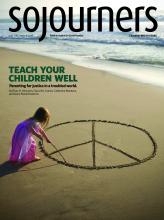Jonathan Wilson-Hartgrove and Isaac S. Villegas are friends and fellow kingdom-bringers in Durham, North Carolina. Since publishing The Wisdom of Stability in 2010, Jonathan has been calling Christians to put down roots and pay attention to place for the sake of God’s reign. Isaac has gently challenged him to recognize the dangers of stability and the way immigrants or marginalized members of a community are often excluded by those who “own their place.” They offer their conversation as an invitation to discern with them a theology of place for our time.
Isaac S. Villegas: I was working alongside a little girl in our congregation’s community garden at the women’s shelter in Chapel Hill. As we were digging, she looked up at me and said that her mom warned her to beware of lice when playing outside. I reassured her that I hadn’t seen any lice around, but I asked her if she knew what to look out for. “Yes,” she said. “My mom told me to watch out for Mexicans because they bring lice.” I looked down at my hands, wondering if my hue revealed that I’m from lands further south than Mexico. Will this child grow up to think that people like me don’t belong in the South, that we are social contaminants, that our cultures dirty the body politic, that we spread lice?
These are the questions that linger in my mind when I hear my friend Jonathan argue for a recovery of “the wisdom of stability” in the Christian community. In this land where both Jonathan and I live, I’m uneasy when I hear “stability” because I see how such rhetoric belongs to a particular Southern tradition. I am the foreigner, of questionable lineage, that the people who’ve been here longer can reject or accept—reject because they think that I’m a threat to the stability of the community, or accept because they think I will contribute to a sustainable future. In either case, the assumption is that they are the ones entrusted with the land and culture. Arguments about stability have fueled people’s claims to own or steward the land and their assumption that they are the gatekeepers of society, deciding who belongs where.
“I hope to reprogram your default setting,” Jonathan writes in his book. “Our default is to move.” Instead of movement, he points to the witness of trees, which serves as the book’s focal image: “Trees can be transplanted ... But their default is to stay.” I worry that to celebrate stability as the solution to movement renders recent immigrants as defective Christians—wild, unruly, in need of reprogramming.
Movement is my default setting: It’s in my immigrant blood; it’s the story of my family. While the wisdom of stability privileges the parts of the Bible that call us to permanency, I find good news in the biblical stories of wandering, exodus, relocation, and mission. These stories resonate with the lives of migrants—people who are not trees, but birds: always building and abandoning nests as they follow the seasons.
Jonathan Wilson-Hartgrove: Every writer needs friends who remind them that words can be dangerous. I’m grateful for Isaac, who keeps me thinking hard about what I’m saying and why.
Shortly after The Wisdom of Stability was published, I got a call from the director of a mission agency who’d read the book. He asked if I’d come and speak to the global gathering of the group’s staff. I’d love to, I told him, but wondered why they thought a word on stability was needed. “Well, we have a problem in missions,” he said. “We keep sending people who’ve never belonged anywhere. They don’t seem to have much capacity to connect with the places where we send them.”
Read the Full Article
